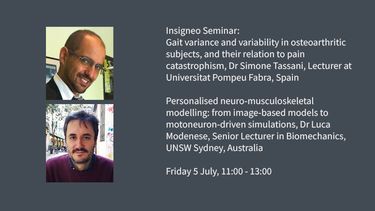Insigneo Seminar: Dr Simone Tassani and Dr Luca Modenese

Event details
This event has taken place.
Description
We are pleased to be hosting two talks at our upcoming Insigneo Seminar on Friday 5 July 2024.
'Gait variance and variability in osteoarthritic subjects, and their relation to pain catastrophism' Dr Simone Tassani, Lecturer at Universitat Pompeu Fabra, Spain
Abstract:
During our life several factors can impose kinematics variation over gait. In the case of pathological subjects can be challenging to discriminate between the effects of the pathology and the ones of the other factors. For instance, in Osteoarthritis of the knee, the maximum ranges of motion can decrease during the progression of the pathology, but so can also happen because obesity of the patients. The variation of the gait pattern can be related to the variance of the magnitude of some variable, but also to temporal changes and variability of the phase. Coordination of different body segments can also play a role in the identification of a specific musculoskeletal pathology. Finally, emotional factors, like pain catastrophism, might be related to mechanical changes and drive the decision to undergo a total knee replacement. Non-linear time series approaches can help in the study of osteoarthritic gait and its relation to emotional characteristics of patients.
Brief biography:
Dr. Tassani holds a Ph.D. in bioengineering (2009) from the University of Bologna, Italy. During his studies, Dr. Tassani focused in biomechanics of bone tissue in osteoporotic and osteoarthritic subjects. In 2010 was awarded a Marie Skłodowska-Curie fellowship and moved to the National Technical University of Athens, Greece, where he carried out his post-doc in data science, classification techniques, image processing and bioethics (TUe, Eindhoven, The Netherlands). In 2014 he was awarded the Beatriz De Pinos -AGAUR Marie Sklodowska Curie Cofound fellowship and moved to Barcelona, Spain, to study the relation between movement, breathing, posture, and management of stress. In 2016 he became a visiting professor at, Universitat Pompeu Fabra. Since 2023 he has been a lecturer, teaching biomechanics, statistical models, research methodology, and design of experiment courses, and he is part of the Nonlinear Time Series Analysis Group where he is exploring the nonlinear behavior of human movement.
'Personalised neuro-musculoskeletal modelling: from image-based models to motoneuron-driven simulations' Dr Luca Modenese, Senior Lecturer in Biomechanics, UNSW Sydney, Australia
Abstract:
Musculoskeletal models are computational representations of the musculoskeletal system and neural control of movement that can be used to simulate human motion. In this talk, I will present some recent technical developments for generating, in a fully automated way, accurate models of the musculoskeletal system of individuals from standard medical images. Building on that, I will present a motoneuron driven model of the neuromuscular control that we have recently developed using spike trains of motor units obtained from decomposition of high-density electromyographic recording as input. This personalised neural controller, when coupled with image-based models, represents the highest level of neuromuscular personalisation currently achievable in vivo with non-invasive techniques.
Brief biography:
Luca Modenese was awarded a PhD in biomechanics from Imperial College London (UK) in 2013. After that he worked as postdoctoral researcher at Griffith University (Australia) and Insigneo Institute for in silico Medicine (University of Sheffield, UK). In 2017, Luca was awarded a prestigious Imperial College Research Fellowship in computational biomechanics and since 2022 he is a Scientia Senior Lecturer in the Graduate School of Biomedical Engineering of the University of New South Wales in Sydney, Australia. Luca has published more than 45 publications and is a strong advocate of open science, maintaining several open-source projects, including the popular awesome-biomechanics public list of resources.
Location
53.382657550565, -1.47774535
When focused, use the arrow keys to pain, and the + and - keys to zoom in/out.

